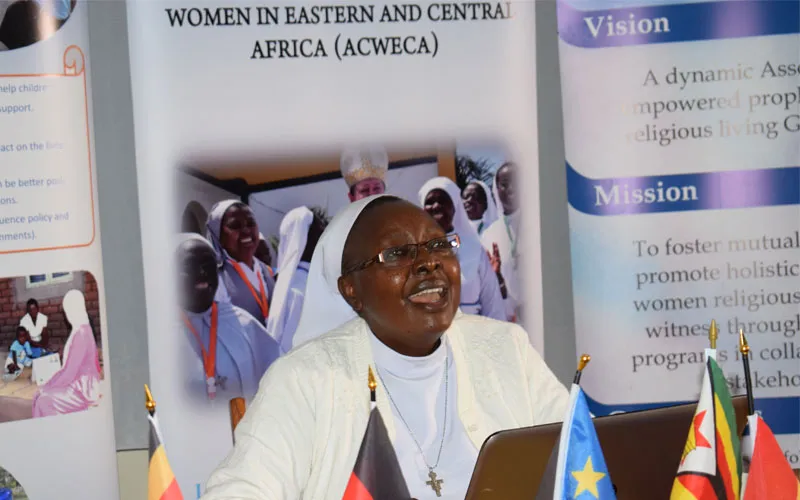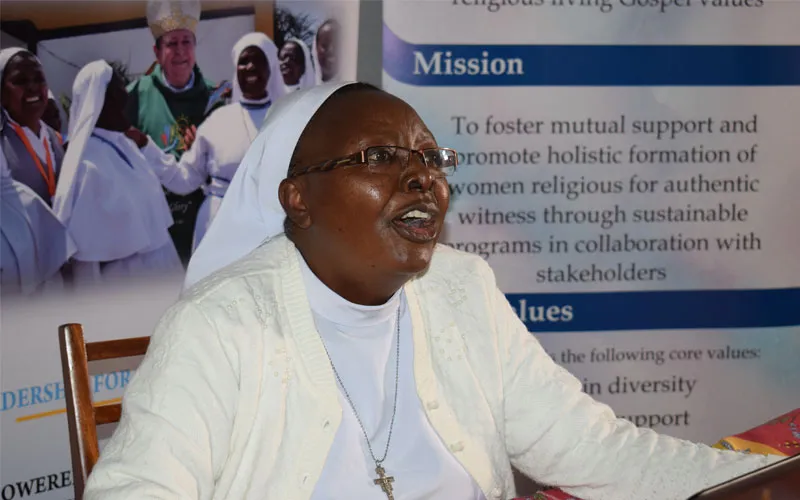In her August 24 presentation obtained by ACI Africa, Sr. Bibiana regrets that when Catholic Nuns are not well formed, the formation team is blamed, which she says should not be the case.
In formation houses, the stress of balancing Religious Life in the areas of prayer, community life and ministry is also evident.
Sr. Bibiana explains that communal prayer varying from community to community begins between 4 a.m. and 6 a.m. and is followed by long hours of ministerial services.
Other activities include community activities ranging from kitchen chores to gardening or other responsibilities unique to a Congregation.
According to the Kenyan Nun, such daily routines can result in burn-out among community members.
(Story continues below)
“Exhaustion can further result in poor performance at work and even in personal life,” she says, and adds, “The art of balancing between prayer and work is a serious exercise which if assumed to be nonexistent while not, can adversely affect the very center of religious life, intimacy with Christ and the prophetic role he mandates.”
As for the generational gap challenge, Sr. Bibiana noted that as a Congregation grows, the age difference between members becomes quite evident.
“At times younger members of a Congregation feel misunderstood by older members and vice versa,” she said, and added, “If not realized and arrested on time this can lead to division among members and to unnecessary and unhealthy class groupings, which deter growth of the Congregation.”
The Kenyan Nun has also observed growing individualism among the Religious, noting that Sisters are being influenced by the modern world to reject communal living with others.
“The modern world is well known to be moving towards the direction of individualism. Among Africans communal living has been the mode of living but in the recent past this is no longer the case. What happens in the larger society influences Religious Life too since we do not live in total isolation,” she says.
She adds, “It is emerging today in Africa cases of Religious men and women who prefer to stay alone in an apartment, a hostel or hotel environment. Other emerging manifestations of individualism are low practice of community prayer, socialization or having shared meals.”
Closely related to individualism in Religious Life is the emerging trend of materialism where the Consecrated and those still in formation are battling the temptation to own material wealth, Sr. Bibiana says.
And as the world becomes a global village, the Religious Sisters are getting impacted by international fashion and music, she further says.
Sr. Bibiana makes reference to the popular Jerusalema dance that attracted a lot of participation, with Sisters from various Congregations showcasing their moves in the chain dance.
She describes the adjustments that come with globalization as attitudes and behaviors that can undermine Religious Life, values and decorum.
According to the LSOSF member, globalization has also encouraged individualism and careerism that she says has led to competitiveness and a weakening of common life.
 Sr. Bibiana Ngundo during her presentation. Credit: ACWECA
Sr. Bibiana Ngundo during her presentation. Credit: ACWECA
She says competitiveness can arise when access to professional education and training is limited by expense, so that only a few are given opportunity.
She notes that leaders of Congregations may also hesitate to send Sisters for further studies fearing loss of temporary or professed members once they have obtained degrees. When this happens, Sr. Bibiana says, the entire Congregation suffers, as capacity of the entire group is slowed by loss of talent.
Additionally, Religious Sisters are battling demands of the times, the Kenyan Nun says, and explains, “Today Congregations are confronted with a world of certificates.”
She explains that those who join Religious Life are required to obtain a certain grade in their fourth year of secondary school education.
Because many of them might not have had further training, it is the responsibility of the Congregation to get them back to school for career preparation and training, Sr. Bibiana says, adding that it is important for Sisters to enroll new entrants in courses to position them for suitable jobs in various industries.
To tackle challenges facing Religious Sisters and formation houses, Sr. Bibiana calls for collaboration among Congregations at the national conference level.
“So far we have witnessed common formation programs for Sisters in initial and ongoing formation, which is very important. Every year young women Religious from different formation houses gather in Dimesse Sisters for common formation classes,” she says in reference the Nairobi-based facility of Dimesse Sisters.
Many other Sisters willing to take formation courses at the house are, however, hindered by the lack of funds, desire to form separately, and lack of planning, Sr. Bibiana says.
She notes that at the height of COVID-19 last year, some Congregations collaborated in common online retreats and preparation for the profession of vows, and adds, “More of these collaborative programs become an asset to the unity of sisters in the region.”
Agnes Aineah is a Kenyan journalist with a background in digital and newspaper reporting. She holds a Master of Arts in Digital Journalism from the Aga Khan University, Graduate School of Media and Communications and a Bachelor's Degree in Linguistics, Media and Communications from Kenya's Moi University. Agnes currently serves as a journalist for ACI Africa.




 Sr. Bibiana Ngundo during her presentation. Credit: ACWECA
Sr. Bibiana Ngundo during her presentation. Credit: ACWECA
 Sr. Bibiana Ngundo during her presentation. Credit: ACWECA
Sr. Bibiana Ngundo during her presentation. Credit: ACWECA


